The story of the king and the maid
The first story of Mawlana's Masnavi is perhaps the most important and meaningful story of Masnavi; Because Mawlana (Rumi) considers it his "criticism of the present", that is, the state he felt or feels, he saw in this story and in a way he wants to express his own perception of love and mysticism and his personal experience of romantic feeling with tell this story and convey it to the reader or listener. Anyway, Maulvi is a storyteller who knows how to start his book so that it has traction and draws the reader or listener towards him. We know that the first eighteen verses of the Masnavi are the summary and compact of the entire Masnavi, and in other words, the entire Masnavi (about 26 thousand verses) is an explanation and embodiment of these opening verses of the book. In these verses, separation and love and its necessity for human beings have been talked about. The story of the maid and the king seeks to explain the same verses and give examples for them. Therefore, any interpretation of this story can be a representation of the main theme of all Masnavi.
In my opinion, the first story of Masnavi, i.e. the king falling in love with a maidservant, is included in the same collection of stories as "Sheikh Sanaan" and "Salaman wa Absal" which we have talked about before. The theme of this story is the acceptance of human and earthly love and making it a prelude to divine and mystical love. All the features of the story of Sheikh Sanan, Salaman, Absal, etc. can also be found in this story:
Love emerges, incompatibility between the lover and the beloved (the king and the maid), the disappearance of the
beloved at the end of the story (the death of Tersa's daughter, the death of Absal and the death of the goldsmith who is the lover of the maid), the presence of a sage or divine messenger and... which we will mention at the end of the story. By the way, the story of Mawlana's life and his love for "Shams Tabrizi" is also reminiscent of the same theme: the incompatibility between the lover and the beloved "Shams and Mawlana (Rumi)" (who are far apart in terms of age and are also of the same sex), which itself is considered a form of anomaly and incongruity because in Persian culture and literature, love is always based on the duality of
a man and a woman in a romantic relationship) and the disappearance of the beloved or his death (Shams Tabrizi).
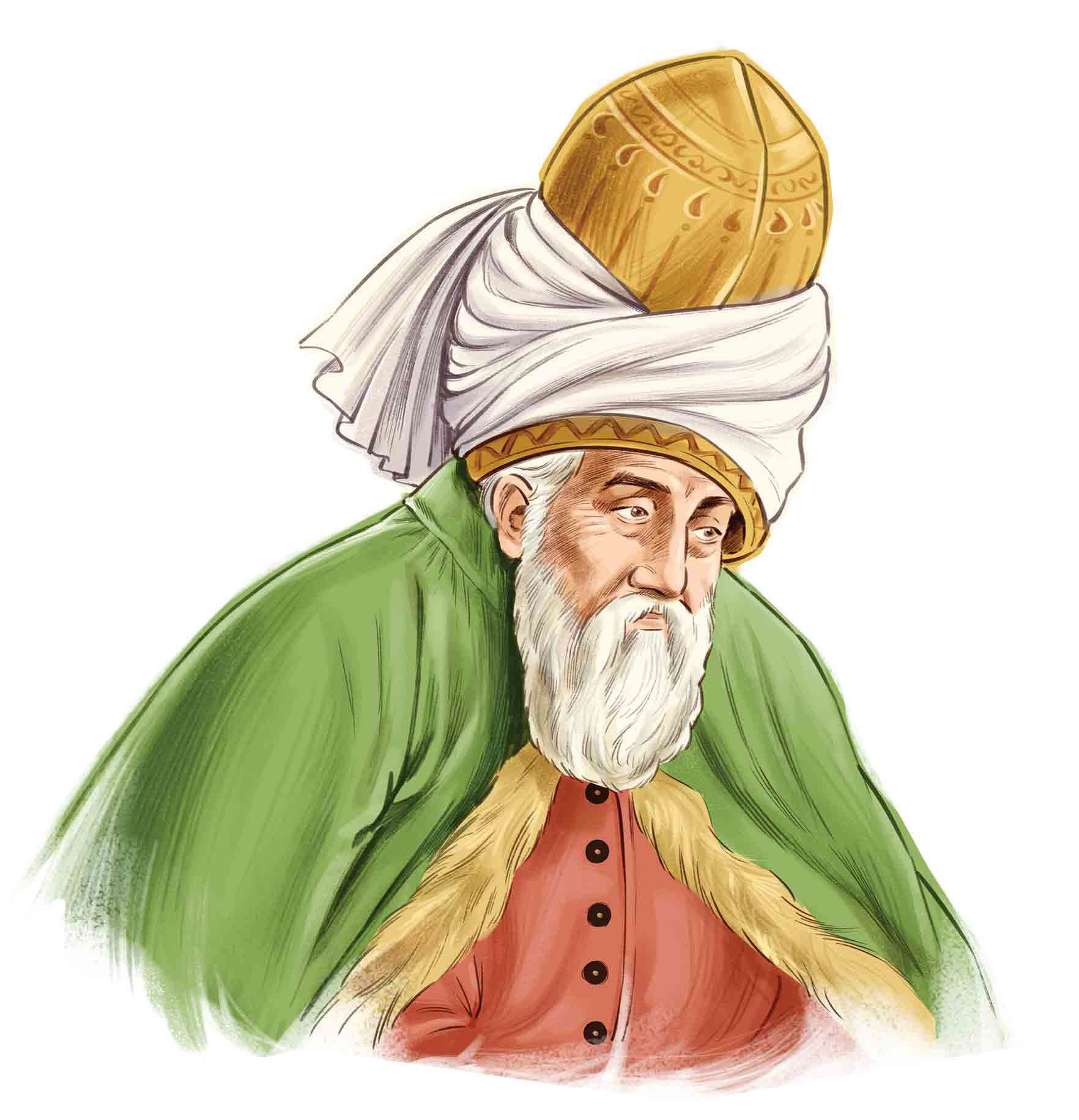
Maulana Jalaluddin Maulavi Balkhi, a great Persian poet
The story of the Masnavi begins like this: the king falling in love with a maidservant and planning on her health
Listen, my friends, this story is the truth of our current situation
He was a king in a time before this, he was the property of the world and also the property of religion
By the way, one day the king rode with his properties for the purpose of hunting
He saw a maidservant on the highway and became the slave of the king's maidservant
The chicken gave its life in the cage because it was beating and bought that maid
Because he bought her and was blessed, that maid fell ill.
(Edited by: Dr. Abdul Karim Soroush, verses 35-40)
One day, a powerful king who has religion and politics at the same time but has never experienced "love", goes hunting and when he returns, he sees a slave girl in the market, falls in love with her and buys her. When the maid arrives at the king's palace, she falls ill. The king gathers doctors from all over the country and offers a huge reward for the treatment of the slave girl.
Doctors confidently promise treatment and forget to ask God for help. God also reveals their inability to treat the maidservant and makes all their efforts useless. The treatment of the doctors has the opposite effect and the slave girl becomes weaker and weaker. Disappointed by the doctors' treatment, the king goes to the mosque and prays to God and asks Him for help. In the middle of crying and praying, he falls asleep and in his dream he is informed that his prayer will be accepted and his wish will be fulfilled. In the morning, a wise sage comes to her and heals the maid.
Shah Tabiban collected them from left and right and said that the lives of both are in your hands
My life is easy, my life is his, I am painful and tired, my cure is his!
Whoever cured my life, took away my treasure and door and coral
They said that we should become veterans, gather understanding and accumulate
Each one of us is the universal Christ who heals every pain in our hearts
If God wills, they will not say about Batr, then God will show them the weakness of human beings
(Bits 43-47)
That maid became like hair from disease, her eyes became like tears from tears of blood
If you give the helplessness of those sages, he ran to the mosque with bare feet
He went to the altar in the mosque, prostrated himself and was filled with tears
When he came to his senses, he opened his tongue in praise and prayer
How little is the forgiveness of the property of the world! what do i say Because you know the secret
Oh, we always need shelter, once again we have gone wrong
You said like, although I know that you will soon find an effect on your appearance
Because the feeling of happiness came to a boil from the heart of Ender
In the middle of crying, he saw in his dream that he was getting old
He said, oh! Good news! Your needs are met, if you have a stranger coming tomorrow, we are with you
In its treatment, see absolute magic, in its temperament, see the power of truth!
When that promise came, the sun shone from the east
He was inside the landscape, he was waiting to see what they put on his head
Fazeli's personal vision, full of sunshine in the middle of a shadow
You could see from a distance that it is not like a crescent, it was and is, like an illusion
The dream that Shah Ander dreamed appeared on the guest's face
The king went to welcome that sage and embraced him and placed his seal in his heart. He kissed his hand and face and greeted him. He took him to the palace and said to himself:
- I finally found a treasure with patience!
Then he took him over the patient and told the story of his illness. The wise doctor said after the examination:
Doctors have not cured him but have added to his illness. What is the early diagnosis of Kanizak's disease? But he did not tell the king anything about this. He knew that the girl has no physical illness and is in love. He said to the king:
- Empty the maid's house of yourself and strangers. No one stayed at home to listen to the words.
Then he took the pulse of the little girl and asked her about her relatives and acquaintances. He asked him which city he was from. Because the patients of each city have special treatment. The maid said everything she knew. The patient's pulse was still in the hands of the divine physician to see with which name and city, the movement of his pulse increased. He mentioned the names of all his previous masters and owners. There was no news. Until it came to the name of "Samarkand" and selling gold in that city. The girl's pulse suddenly jumped and became more intense.
Instead of Hajban, the Shah went to his unseen guest
He spread his hand and held her sides like the love inside his heart and soul
He started kissing his hand and forehead and started asking questions
The press questioned him until he said to Sadr, "I have found a treasure." Finally, be patient
After that assembly passed, Khan Karam took her hand and took her inside the shrine
He should read the story of suffering and suffering, and then sit in front of his suffering
Look at the color of the skin, the pulse and the flask, and hear the symptoms and causes
He said that whatever medicine they have done is not that building, they have destroyed it!
When he saw the suffering and was discovered, he hid it and did not tell the Sultan
His resentment was not due to bile and soda, but the smell of any firewood would appear in the smoke
He saw that his heart is crying, his body is happy, and he is troubled by his heart
Love can be found out of the sorrow of the heart, not the disease of the heart
He said, oh! Be quiet, keep the house away from yourself and the stranger
No one has ears in the corridors to ask the saddle of the maid of things
Where is your city? that the treatment of each city is different
Wonder of that city, who are you related to and what is your relationship with?
He put his hand on his pulse and one by one he asked again about the type of flight
Zan Knizek asks how friends are doing through open story
With Hakim, he used to tell stories about the position, the eunuchs, the city, and Bash
To tell a story, he had an ear, to a pulse, and to search for it, he had intelligence
Until the pulse of whose name is the world? He was the purpose of his life in the world
He listed his friends and his city and then named another city
He said: When you left your city, which city were you in?
He said the name of a city and Zan did not notice the color of his face and his pulse anymore
He told eunuchs and cities one by one about bread and salt
He told stories from town to town and from house to house, neither his veins moved nor his face turned yellow
His pulse is too bad to ask about Samarkand
He looked for a pulse and his face turned red and yellow, as Samarqandi became a goldsmith
Because the sage found this secret through suffering, he recovered the origin of pain and suffering
Hakim asked the address of the gold seller. The girl said it again. Then he said to the maid:
I know what pain you have. I will soon try to cure you and free you from this disease. Consider me as your father.
Just don't tell anyone this secret! If you keep secret for a while, you will achieve your goal. Then Hakim went to the king and informed him a little about the incident. said:
- We have no choice but to bring the gold dealer here and connect Keynes with him.
The king accepted and sent two clever and skilled envoys to Samarkand to bring the goldsmith to the king. They promised him the king's servant, money and facilities, and he was deceived and left. The poor man did not know that these funds would kill him.
He said, "Which one is he in passing?" He said to the bridge and Koi Ghatfar
He said: I know what your pain is, I will solve it soon
Be happy and free and safe, that I will do the same with you, as the rain does with the grass
I am sad for you, I am more compassionate than a hundred fathers
Han and Han! Don't tell this secret to anyone, even if it hurts you, stop searching
The house of your secrets, if you wish, your wish will come true sooner
After that, he got up and decided to call the king
He said that the plan was to make the man ready to suffer from this pain
Call the goldsmith, the distant city with gold and clothes, give him pride!
The king sent one or two messengers to that side
Those two amirs came to Samarkand before that goldsmith from Shahneshe Bashir
Kai Latif is a master of
knowledge! Reveal in the cities from you attribute,
Don't let it be like that, because you are a jeweler because you are precious
Now take this robe and gold and wire as you find it and be special and we won't see it
The man saw a lot of riches and clothing, and he was cut off from the city and his children
Ander came happily on the way of the unsuspecting man, Khan Shah tried to kill him
The goldsmith goes to the king and finds a lot of goodness and kindness from him. Hakim also orders that the maid should be given to the goldsmith, so that when she reaches Vasal, she will feel better and the tension will be resolved. The king does so. They spend six months happily together.
When he arrived from the way of that strange man, he brought him to the doctor
When the king saw him, he bowed down and handed over the gold tank to him
So his sage said, "Kai Sultan Meh, give that maid to this eunuch."
So that the maid will be happy in her connection, water will be connected to her, and fire will repel her
The king gave him that love and paired those two atmospheric talks
For six months, they kept driving until that girl was completely healed.
Then the sage prepares a medicine and gives it to the goldsmith to make him sick and weak. Due to pain, weakness and yellow face, the goldsmith loses his
beauty and falls from the eyes of the maid. Zargar says to himself:
- I was like a deer whose blood was shed by the hunter for the benefit of my fragrance. My beauty killed me. But will the person who killed me be spared the punishment of shedding innocent blood like me? Today it was my turn and tomorrow it will be his turn. Then he dies.
After that, he made syrup for her to drink and poured it in front of the girl
Because his beauty did not remain because of his suffering, the girl's life did not remain in his hands
Because he became ugly and unpleasant and his face turned yellow, little by little, he became cold in his heart
Blood ran from his eyes as the enemy of his life came upon him
He said, "I am that goose, because this hunter poured my blood from my navel."
The one who killed me, doesn't he know that my blood is not spilled?
It is on me, today and tomorrow, the blood is on him, because of me, who is such a waste?
He said this and left my pain under the dust of that maidservant, pure from love and suffering.
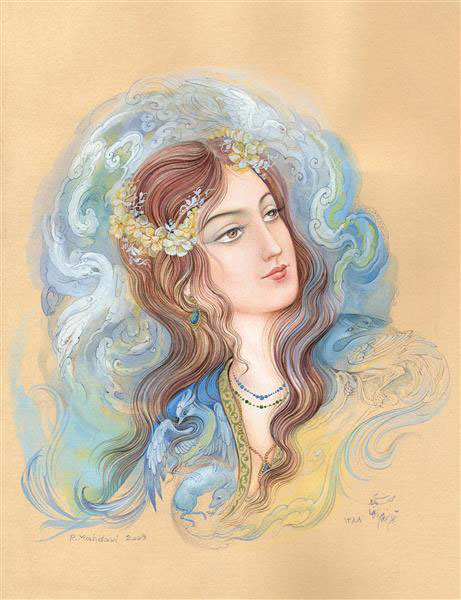
Love and connection are one of the most important themes of mystic poems
After the goldsmith's death, there is no longer any obstacle to connect the king and the maid. The two meet and the story ends. This story has a major difference from other stories of Mawlavi's Masnavi, and that is that while narrating it, no other main or sub-story has interrupted the coherent and unique space of the story. As we know, other stories have an overlapping form and a story keeps interrupting the narration of the main story and then the narrator returns to the main story. The importance of this point is that Maulvi wanted to say what is in his heart in one breath in order to provide an interpretation for the love letter of the first "Ni Namah". From now on, the theme of the stories has nothing to do with love until the third book, where it is again a love story (the lover is busy reading love letters...). Usually, the writer or poet, due to the fear of passing his life and not having the opportunity, first expresses what he sees as the most important. Therefore, it can be said that Mawlana's motivation and intention from the beginning of composing Masnavi, the first verses and this story. But what are the secrets of this story?
Before unraveling the adventures of the story, it is not bad to know whether the story or elements of it existed before Mawlana or not.
This story was apparently not known before Mawlana and it is possible that it is a figment of his imagination. Of course, the way of treating the maidservant is related to Ibn Sina (four articles: Nizami Prozodi Samarqandi, corrected by: Mohammad Qazvini, edited by: Dr. Mohammad Moin, pp. 129-131 of the contemporary voice publication, first edition of 2008) and even in one of the stories of "D Cameron" is attributed to Roman medicine by Boccaccio (14th century Italian writer).
Boccaccio, in the eighth story of the second night of the book "De Cameron", gave a story like this: a young but wise and experienced doctor is sitting on the patient's bed and taking his pulse in his hand. Jeanette, who did not fail to nurse the patient and fulfill her wishes for the sake of her lady, enters the patient's room to carry out an order. As soon as the sick young man saw Janet without saying a word or moving, he felt the fire of love in his heart more intensely and his pulse began to beat more strongly than usual. The doctor noticed this immediately and was surprised. But he strained his ears to see how long the intensity of the pulse would continue. When Janet left the room, the pulse rate also decreased and the learned doctor thought to himself that he had found the root of the disease to some extent. He waited for a while and then, on the pretext of wanting something, he called Janet inside again without letting go of the patient's pulse. Jeanette showed up right away. As soon as he stepped into the room, the patient's pulse started beating fast again, and when he went out, it returned to its original state. The young doctor, who had no doubts left, stood up. He asked the patient's parents to be alone and said to them:
- The healing of your son is not in the power of doctors, but in the hands of Jeanette.
(De Cameron, Boccaccio, translation: Mohammad Ghazi, Maziar Publications, first edition 1379, p. 189)
The part about giving medicine to the goldsmith to make him sick and ugly is also mentioned in a different way in one of the stories of Iskandarnameh. There the medicine is given to the maidservant. Most likely, Maulavi made this story inspired by the beginning of the story of Samak Ayar and the love of Khurshid Shah, the son of Marzban Shah, with Meh Pari, the daughter of Shah Chin. There, when Khurshidshah sees Meh Pari in the tent and then she disappears, he becomes sick from her love:
"... the prince fell ill in that sadness and turned saffron and even though doctors and sages treated him, he did not accept any treatment; that his cure was meeting a friend, not heat and cold, humidity and constipation... to the end that everyone took heart from him. Although the doctors treated him and gave him food like water peas, it was of no use:
If the doctor can bring death from himself
And Fakhr Gorgani said in this sense in the story of Weiss and Ramin:
Someone put a snake charmer on the liver, make opium, not tabarzad
Although sugar pleases the mouth, not like opium makes the tired
Although flower water is clean and not fragrant, it quenches thirst like water in the atmosphere
Even though the prince eats agreeable potions, it was of no use to him. Sorrow would increase upon sorrow. Khursheedshah's condition is sad. Father fear for his life..." (Samak Ayyar, Faramarz bin Khodadad, with the introduction and corrections of Parviz Natal Khanleri, Aghah Publications, 7th edition 2015, p. 20)
Here too, an old man arrives and reads the code of the ring and cures Khurshidshah:
"...Suddenly, an old man wearing a man's clothes and holding a staff asked the people... The king looked and saw that old man. He played and honored his child and raised him and sat him on the throne. That old man opened his mouth and treated him as a doctor and
told him that the medicine of truth was in the hands of that old man. The nanny sat behind him and listened to what they were saying..."
(same p. 23)
But the overall story of the king and the concubine in Masnavi has a new construction. Mawlana noticed a moral critique of the story and has already answered it: Why did the doctor kill the goldsmith?
Maulvi says: This work was done not because of the hope of salary, nor because of the fear of the king, but because of God's command and inspiration. Then he compares the doctor with Khizr: "...Khizr also cut off the head of a child, but by God's command. God is aware of the wisdom of actions and can take away the life that He has given:
The king of that blood did not pursue lust, so leave suspicion and fight..." (B230)
Unraveling the story:
In this story, there are two love networks: a- the king's love for the maid b- the love of the maid for the goldsmith
The goldsmith (beloved) is a symbol of worldly and material love and should be destroyed. (Pay attention to the beloved in the stories of Sheikh Sanaan and the beloved in Salaman and Absal, they have the same fate. (The medicine that the divine doctor gives to the goldsmith is the imagination of the unsavory traits.) corresponds to "emptying") and the medicine he gives to the maidservant is nourishing, ornamental, and beautifying, which is equal to the second stage of enlightenment (Tahliyyah) and makes the maidservant worthy of the king's love. The maidservant survives because she is from the beloved stage The carnality of the past and while tasting worldly pleasures and goldsmiths have had enough of it. The king is a symbol of a human being who is incomplete before falling in love and becomes complete after falling in love. According to Maulvi, the "perfect human" is that which is "Love" which equals "manifestation" or "truth" has arrived. If we examine the story from the point of view of symbolism, killing the goldsmith is justified because he is the embodiment of all the worldly charms and desires of nature and must be to open the path to the truth. In reality, such an incident has not happened so that we can look for the doctor's right or not to kill him. Mawlana (Rumi), who thought for a moment about the real possibility of such a thing, gave a mystical answer to the problem and that called God's order.
The question is, why is the world of "the death of the beloved" proposed and accepted in mystical literature? Why do mystics talk so much about death and being killed? One answer is that whatever hinders the meeting of the right or is favored against the right, must be destroyed:
Piri had two precious things: his son and his horse. One day he said:
- If someone brings the news of my son's death, I will give him my horse as a reward, because these two things prevent me from meeting the truth.
Dad said about Pir Turkestan Khabar himself: "I have two things that I love more."
That one is a horse, Ablaq, the walker of Wayne is none other than my child
If I find news, I will forgive the death of this boy thanks to this news
Zan, I see that these two things are like two idols in the eyes of dear John
So that you don't burn and make like a candle in the middle of the game
(Logic of al-Tair, Attar Neishabouri, introduction, correction and comments: Dr. Mohammadreza Shafiei Kodakani, Tehran, Sokhon Publishing House, first edition 2013, p. 348)
Another example:
Sheikh Kharqani, whose throne was his porch, was once his passion
His mother was so angry with the Sheikh that she gave him half an eggplant by force
When he ate half of the eggplant, they cut off the head of his child
As the night came, the head of that noble man was laid on his threshold
The sheikh said: "No, I have told you a thousand times in confusion
Why did the beggar eat eggplant before he was hit?
Whenever my time burns, it's not like that, with him, my work is easy like that.
Although there is a hundred sorrows, it will also come to the dear soul
Whosoever is exposed to the secret of my absence, wants to shed blood on his head
(Ibid., p. 348)
Unfortunate Arefi loses his son due to Badanjani's punishment. What is the son's sin that he has to sacrifice a father's
natural desire? Another example:
Dhul-Nun said: "I would have been in the Bedouin, relying on Tawakkel, without a cane and angle."
I saw Chel Marqa Posh on the way of life, giving a sentence on a place
A rebellion broke out in my mind, a fire broke out in my soul
I said: What is this, God? How many servers are you running?
Hatfi said: "We will pay for the work of our ad and pay them ourselves."
He said: "How much do you want to kill?" He said: "As long as I have a date, this is the job!"
I will put his blood on the soil of this mountain
I will make him a shadow in my house, so I will put the sun on me
Since the sun has risen on me, when will there be a shadow in my place?"
(Ibid., p. 349)
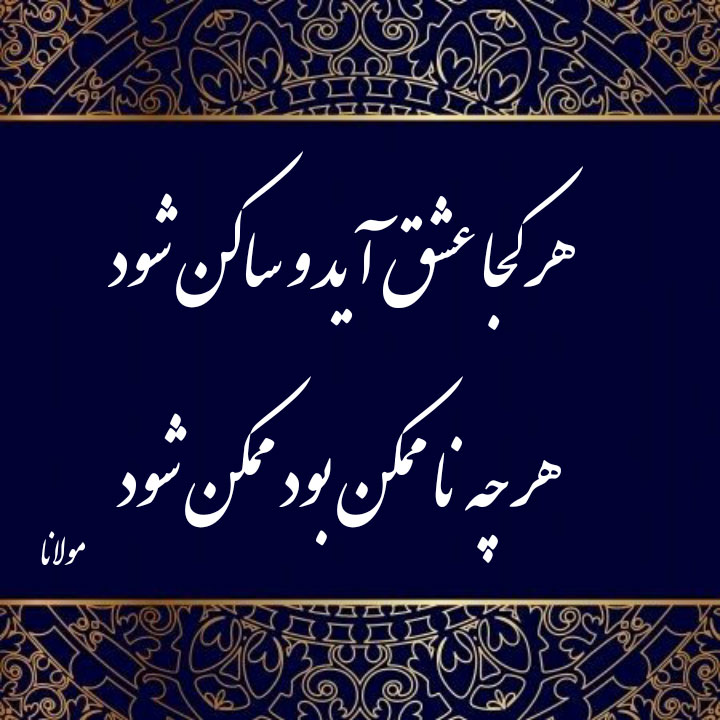
Rumi and mystical love poems
God is the one who kills and pays the price of blood. But what is blood price? Neil Arif to meet God. Is there such a pleasure in meeting God that you have to sacrifice the sweet and dear lives? Can't God grant this visit to his servant without the torture of pain and death?
Another reason for all this talk about death and killing is probably many murders and wars during Attar's time and before and after him in Iran. Perhaps the mystics wanted to give consolation to the bereaved in this way and to put them in a peace caused by the satisfaction and acceptance of death. If death is a sign of will and divine will, if death goes to the dear and valuable people of the society, don't the killed and their survivors face the disaster more calmly and comfortably? Isn't it a form of valuing oneself and accepting the consequences of being the same as the prophets and divine saints who lived in the most suffering?
Again, we can ask: since when and on what example and model did the mystics bring up the death of the beloved (not children, loved ones, etc.) in mystical literature?
In ancient Iran, there are two detailed stories (probably of Indian origin) in which the protagonist, before starting to rule and lead a normal life, goes through a special experience, which is that he is infatuated with a lover. They reach their limits and then come to their senses and destroy the lover. These two stories are:
1- Sinbad Namah
2- Bakhtiar Namah
After this, we will write the abstract of these two stories. We are saying here that these two stories are the structural model of stories like "Sheikh Sanaan, Salaman and Absal, the story of the king and the maidservant, and stories like them. Although the influence of Plato's theory about love is also obvious. Plato considered earthly love to be the prelude to heavenly love. Let's remember that the story of "Salaman and Absal" is also translated from Greek and is in harmony with Plato's opinion.
Others have spoken in detail about the mystical insights from this story.
(Nicholson, Frozanfar, Zarinkub, etc.) We look at it from a different perspective. In our opinion, apart from being considered a mystical work, Mawlavi's Masnavi is also a criticism of politics and society. The reason is that there are dozens of stories about the Shah and caliphs such as "Muawiyah" and... criticizing their performance. We will bring examples if we are successful. The social and political points of this story are:
1- In this story, a woman is surrounded by men (king, doctor, goldsmith and even God). They choose him without
giving him the power to choose. Men have the right to choose. A woman is a passive and active being who in this story has no other advantage than her beauty and love, and of course her love is also determined by men. It is a powerless and powerless creature that does not show any other reaction than getting sick. There is no report of rebellion, stand-up, and special activity of him.
2- The king (powerful man) hunts women just as he hunts animals.
3- A man is a slave of a woman and obedient to her as long as he likes her: he became the slave of the king's maid
4- With his political, physical and financial power, a man can make anyone he likes his own: he gave money and bought that slave girl.
5- The satisfaction of a woman's heart is not important for a man: that maid got sick by irony
6- A man uses all his means to take advantage of a woman: Yes, doctors gathered from left and right.
7- Turning to spirituality and prayer in order to access materiality: He went to the altar in the mosque.
If the king does not face the problem of the maid's illness, he does not turn to the altar and pray. According to today's people: using the altar, God and prayer as a tool.
In the imagination of most people, God exists to fulfill their desires. If there is no need or feeling of need, there is no need for God. Our objective experiences show that we realize the presence and existence of God in
sufferings and problems. There is no mention of God in joys and pleasures. By the way, many groups have income only because of the existence of God, and these groups try to propose, prove and justify the presence of God and the necessity of suffering so that they do not have no income. One of the causes of spiritual and cultural poverty in societies that have the most spiritual appearance is the lack of God in people's thoughts. God is absent in thoughts and present in unpleasant feelings. We attribute our sufferings to him, we fear him, we consider him our servant and we never know him. Sufism and practical mysticism are characteristic of sentimental societies, and philosophy and thinking are characteristic of rational societies. Contrary to the popular popular belief that: God is known by the heart (superficial mysticism), thinking about God and knowing him is reserved only for the intellect. The conflict between mind and heart in the East, of course, has led to the victory of the heart, but nothing of God's authority and majesty can be seen in the social sphere of the Orientals. The God created by the heart, please the heart and the God of the mind, independent of the world and man, true to nature and wise; Or in other words: Hakim.
8- The doctor in the story is a man who came from God. The king, who owns both the property of the world and the property of religion and the owner of religion and politics, sees in his dream an old man - not an old woman - who gives the good news that the king's need will be fulfilled. In traditional thinking, it is impossible for a woman to come from God or to be an inspiration to him - a revelation that has its place. The agents of religion and the world, thinkers and possessors of minds and opinions are all men. Where is the woman's place? ... in the shrine:
After that assembly passed, Khan Karam took her hand and took her inside the shrine
In traditional and mystical thinking, a woman is a beautiful, desirable and enjoyable creature that should be kept in the sanctuary and away from the reach of others - the society - and she is also a disease that needs care, treatment and compassion. The man, the owner of the woman and himself can be exchanged and bought and sold:
Dad bought the property and that maid.
10- If a woman loves someone, she should kill him. Maiden loves goldsmith. On the doctor's advice, the king calls him and tricks him to send him to death. That divine doctor clearly advises:
Make him proud with gold and clothes.
Cheat him with money.
11- Politicians are allowed to lie and deceive to achieve their goals. On the one hand, the doctor deceives the maid in order to find out the secret of her love and considers himself to be her sympathizer and savior:
I am sad for you, I am more compassionate than a hundred fathers
It means: it is not necessary for a woman to do anything and take the grief of something, men will think for them and take care of them. On the other hand, he plots the death of the goldsmith - the lover of the maid.
A little later, Maulvi states a truth:
Steal the words of their dervishes, don't go to read Bar Selimi, Zan Fesun
Men's work is bright and warm, Donan's work is cunning and shameless
(Bits 319-320)
The work of lowly men is to abuse the words of others to deceive simple hearts. Real men try to create warmth and light in the lives of others.
The doctor, shamelessly, uses the trick to light and warm the house of the king, not other people who also happen to have rights.
If a woman gives love to someone, this love must be under the supervision of a man. The king gives the slave girl to the goldsmith for a short time.
12- After the woman recovers and finds her former beauty and freshness, the doctor drinks a deadly syrup to the goldsmith. Goldsmith turns yellow and ugly. A woman's love for him decreases. It means that women do not look at their appearance.
In this story, the king is a powerful person who: 1- Takes other people's wives. 2- He wastes the country's money on his whims. 3- He seeks profit from spirituality, mysticism and religion to achieve a private and lustful goal.
13- The important point is to know that when Maulvi reads this story as his "Naqdhal", he equates himself with which of the heroes of the story? Is Maulvi the same divine physician? Or a maid? Certainly, Shah and Zargar, none of them are similar to him. The doctor can be the same cleric who has soul medicine for the treatment of disciples and other worldly patients. But it seems that Kanizek stays with Maulvi more than others: like Maulvi, she is separated from her city and memories. He is the one who has been loved by the king - God. Most importantly, the maidservant can be a suitable symbol for an oppressed person. The following stories are all expressions of the oppression that the king or the lion inflicts on the people. Only by maintaining the connection of the stories can we reach a measured system of Mawlana's political thought.
Before going to the examples of Maulavi's politics in his Masnavi, let's fulfill the promise we made. We said that stories like "Sheikh Sanaan", "Salaman and Absal" and "Shah and Concubine" have older roots, which by the way, while having a romantic approach, they also
present a political message. The fusion of love and politics has many examples in Persian culture: from Fakhreddin Gorgani's "Vais Varamin" to "Khosro and Shirin Nizami" and "Sandbad Nameh" and... "Sandbad Nameh" is one of the sources of such stories. Is. It is not bad to get to know it a little:
Sinbad Nameh / written by Muhammad bin Ali Zahiri Samarqandi; Introduction, proofreading and research by Dr. Mohammad Baqer Kamal Aldini. Tehran: Written Heritage Publishing Center, 1381. Based on the Shaban 604 edition available at Tehran University.
About Sinbad Namah
One of the ancient Persian fiction texts in the 6th century of Hijri is the book of Sinbad Nameh, which is written
in artificial and embellished prose and has been an example of writing in the past decades, just like Kalileh and Demeneh. Its expressions and combinations are similar to "Kalila and Damneh" and especially many of its Persian and Arabic verses are the same as what is in Kalila and are definitely adapted from it. The text of this book is mixed with Persian and Arabic poems. The author of the book is Zahir al-Din Muhammad bin Ali bin Muhammad Zahiri Samarkandi, who also left another book called Agraz al-Siyaseh fi Araz al-Riyaseh, which is among the famous people of history. Many anecdotes of Sindbad Nameh are found in Zia Nakhshbi's "Tooti Nameh" (by Fathullah Mojtabaei - Gholam Ali Aria, published by Manochehri) and a few of its anecdotes are also in "Awfi's Tales Society". (Ahmad Ezzati Parvar)
Summary of the story:
It was a king who was righteous by profession and raised subjects who did not have children. Until, after vowing and asking God Almighty, he had a son. The king gave the boy to "Sandbad Hakim" to teach him knowledge and wisdom. When the boy grew up and had knowledge, because he was the owner of beauty, he became the object of love and affection of one of the women of the king's harem:
"There was a maidservant in the king's palace and she was in love with Jamal this boy for a long time. Because he did not find victory over the Kaaba of his connection, he was surprised in the badia of parting and was pleased with his connection." P. 50
The woman expressed her love to Malekzadeh and said: If you grant me your vassal, I will poison the king and you will sit on the throne. But because the prince did not surrender, the woman accuses him to the king. The king also believed his words and ordered to kill the child.
Meanwhile, Sinbad - who is the prince's teacher - deduces from astronomical reasons that for seven days, Malekzadeh should close his lips and not speak. Otherwise, it will expire. Until the seven ministers of the king intervened in this case, they saved the prince's life. In such a way that every day one of them reached the presence of the king, he told stories about women's trickery and the harm of haste in affairs and neutralized the woman's words. Until the eighth day arrives and the heavens disappear. Sinbad orders the prince to speak and dispel the slander, and as a result, the king punishes that unchaste woman for her act. (pp. eleven and twelve, quoted by Mojtaba Minavi)
As it is obvious, the theme of the story "Sandbad Namah" is the same as the stories we brought before; That is, here there is also a love that takes place between the prince and the nanny maid (no age) and the lover (maid) is killed in the end (like all the previous lovers). This love prepares the prince to deal with a bigger task (government). Just like in the previous stories, the love of a maid or Tersa's daughter or Salaman's nanny leads the lover to heavenly love. Sin is also seen in this story: the nanny's sinful love for the prince. Therefore, it can be said that due to the older story of Sindbad Nameh, this story is the first form of a story that later transforms and turns earthly affection into divine or mystical love. Obviously, the lateness of the story of "Sandbad Namah" and its belonging to Iran before Islam is the best reason for its non-mystic nature. But later, the mystics found a basis for mystical love from this story, and by keeping the main theme and creating shape and structural transformations, they created examples that are suitable for mystical love.
Sinbad is the name of an ancient sage of India, and Sinbad is a book such as Kalila and Demeneh, whose Pahlavi version existed until the Sassanid era, and in the age of Noah bin Mansur Samani, a man named Khwaja Umid Abolfavars Fenarozi (in 337 lunar year) translated it into Farsi. translation and in 600 AH Muhammad bin Ali Zahiri Samarkandi rewrote that translation.
Source: Research articles blog
Author: Ahmad Ezzati Parvar
Dear Visitor; Please take a look at the list of 50 most visited websites in the world wide web: YouTube, Facebook, google, translate, gmail, weather, amazon, Instagram, cricbuzz, Hotmail, wordle, satta king, twitter, yahoo, yandex, sarkari result, Netflix, google maps, yahoo mail, roblox, whatsapp, NBA, BBC news, outlook, pinterest, flipkart, eBay, omegle, live score, tiktok, canva, ipl, premier league, hava durumu, ibomma, walmart, twitch, ikea, shein, linkedin, home depot, e devlet, lottery, snaptik, cricket, serie a, nfl, spotify, fox news, amazon prime; There is no book publishing related or project management website in this list. We are working hard to bring these important issues to the center of concentration of societies. Please introduce us via social media, share our website with others and help us to make our world a better place to live. Best Regards.









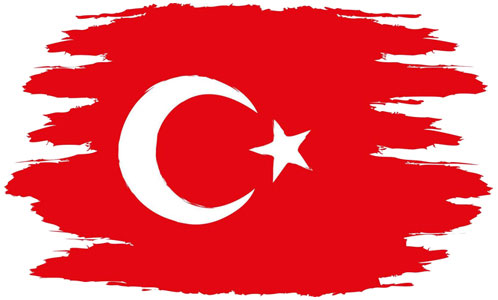



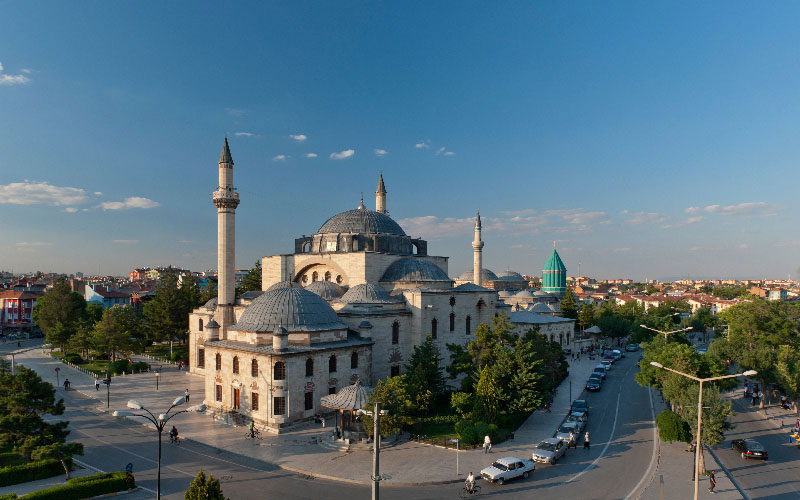
Write your review